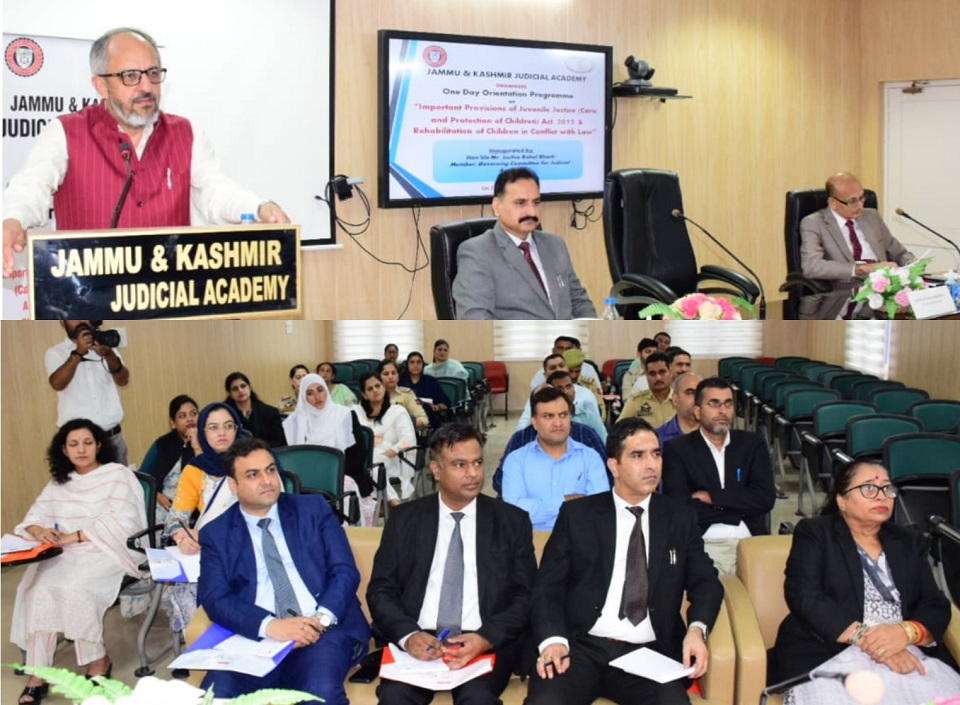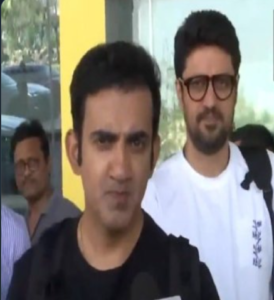JKJA organises one day orientation programme on ‘Important Provisions of Juvenile Justice Act 2015, Rehabilitation of Children in conflict with Law
JAMMU, AUGUST 26: J&K Judicial Academy (JKJA) today organized one day orientation programme on ‘Important Provisions of Juvenile Justice (Care and Protection of Children) Act, 2015 and Rehabilitation of Children in Conflict with Law’ for Principal Magistrate/JJBs, officers of Social Welfare Department, members of Child Welfare Committees and Police officers of Jammu Province at JKJA here.

The programme was held under the patronage of Chief Justice, High Court of Jammu & Kashmir and Ladakh (Patron-in-Chief, JKJA), Justice N. Kotiswar Singh, and guidance of Justice Sanjeev Kumar, Chairperson, Governing Committee JKJA, Justice Javed Iqbal Wani, Justice Rahul Bharti and Justice Moksha Kazmi, members of Governing Committee, JKJA.
The programme was inaugurated by Justice Rahul Bharti, Judge, High Court of J&K and Ladakh and member, Governing Committee, JKJA.
In his inaugural address, Justice Bharti deliberated in detail about Juvenile Justice (Care & Protection of Children) Act, 2015 with special reference to the constitutional vision and concept of Social Justice as well as issues related to juveniles. He stressed on the fact that officers of social welfare department, police department and the judicial system must be aimed at addressing the vulnerabilities of the children and ensuring their rehabilitation.
He observed that idea behind rehabilitation is that nobody is criminal by birth and everybody has a right to get a fair chance to mend his way and get reintegrated with society to lead a dignified life. He underlined the purpose of holding such training programmes to enhance the awareness level of judicial officers and other stakeholders, relating to the laws and to remove inhibitions as well as share best practices while applying the provisions thereof in the day-to-day work.
Director, JKJA, Y.P. Bourney, in his welcome address gave an overview of the programme. He highlighted the salient features as well as statutory changes made in the provisions of Juvenile Justice (Care & protection of Children) Act, 2015 and the underlying philosophy that children in conflict with law need to be reformed and reintegrated into society.
He emphasized that a clear distinction has been made between children in conflict with law and children in need of care and protection. He remarked that prevention is always better than cure and there is a need to ensure that children do not turn to crime at all, in the first place and those who traverse the line.
The Director said that Courts have been entrusted with special responsibility to deal with such cases with utmost care to ensure proper justice and rehabilitation of children in conflict with law.
In the first technical session of programme, Kikar Singh Parihar, former District and Sessions Judge, High Court of J&K deliberated in detail on background events that led to the enactment of Juvenile Justice (Care & protection of Children) Act, 2015 with special reference to powers, functions and responsibilities of Juvenile Justice Board, and about the procedure for enquiry adopted by the Board and orders that may not be passed.
The resource person also discussed the roles of Child Welfare Committees, Child Welfare Police Officer and person in whose charge child in conflict with law is placed.
In the second technical session, Kikar Singh Parihar deliberated upon the provisions relating to children in need of care and protection, their rehabilitation, social integration and adoption. He also gave an in-depth details of legal provisions dealing with offences against children and punishment for it. He also discussed various provisions for children suffering from diseases requiring prolonged treatment or mentally ill or addicted to alcohol or other drugs.
Later, an interactive session was held during which all the participants deliberated and discussed the various aspects of subject topic and raised queries which were answered satisfactorily by the resource person.






